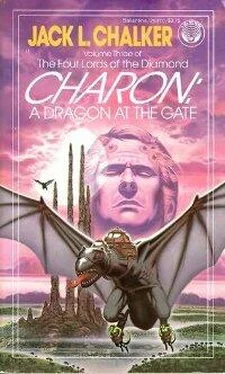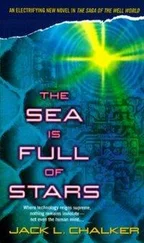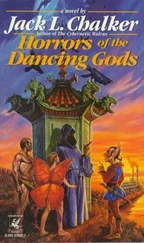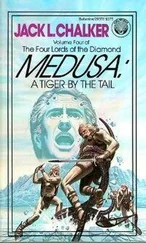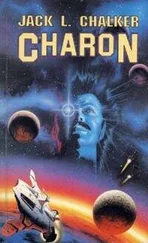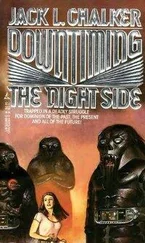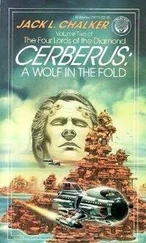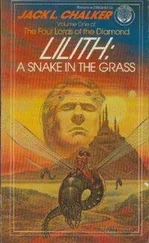Jack Chalker - Charon - A Dragon at the Gate
Здесь есть возможность читать онлайн «Jack Chalker - Charon - A Dragon at the Gate» весь текст электронной книги совершенно бесплатно (целиком полную версию без сокращений). В некоторых случаях можно слушать аудио, скачать через торрент в формате fb2 и присутствует краткое содержание. Год выпуска: 1982, ISBN: 1982, Издательство: Del Rey / Ballantine, Жанр: Фантастика и фэнтези, на английском языке. Описание произведения, (предисловие) а так же отзывы посетителей доступны на портале библиотеки ЛибКат.
- Название:Charon: A Dragon at the Gate
- Автор:
- Издательство:Del Rey / Ballantine
- Жанр:
- Год:1982
- ISBN:0-345-29370-3
- Рейтинг книги:5 / 5. Голосов: 1
-
Избранное:Добавить в избранное
- Отзывы:
-
Ваша оценка:
- 100
- 1
- 2
- 3
- 4
- 5
Charon: A Dragon at the Gate: краткое содержание, описание и аннотация
Предлагаем к чтению аннотацию, описание, краткое содержание или предисловие (зависит от того, что написал сам автор книги «Charon: A Dragon at the Gate»). Если вы не нашли необходимую информацию о книге — напишите в комментариях, мы постараемся отыскать её.
Charon: A Dragon at the Gate — читать онлайн бесплатно полную книгу (весь текст) целиком
Ниже представлен текст книги, разбитый по страницам. Система сохранения места последней прочитанной страницы, позволяет с удобством читать онлайн бесплатно книгу «Charon: A Dragon at the Gate», без необходимости каждый раз заново искать на чём Вы остановились. Поставьте закладку, и сможете в любой момент перейти на страницу, на которой закончили чтение.
Интервал:
Закладка:
Just what had Jatik seen? Into what terrible bondage had they sold themselves and mankind on their own egomania-cal delusions of grandeur?
It was almost as hot as a human being could stand there on the hard, desolate desert, yet Koril felt a sudden chill as he turned and walked away from the body of the dead man.
The most frustrating thing to a great military force is to discover that it is at war only long after the first blows of the enemy have been struck. Even more frustrating is when, even after the discovery of enemy action, you simply can’t find the enemy.
The Confederacy was the culmination of all human history and culture. In the distant past, man had determined that expansion to the stars was the most interesting and preferable means of advancing civilization without racial suicide. Somehow the sporting instinct overrode all else in the human condition when the proposition was put correctly. National competition was something all people, regardless of background or ideology, could understand. They could work for, root for, and cheer on their home team against all comers.
As politics became dirtier and more and more irrational in the twentieth and twenty-first centuries, and total global annihilation grew more and more certain, man remembered that he had first set foot on the Moon because it had been sold as a sporting wager—a space race. Not that space had been ignored since—in fact, every country had been involved—but it had been a slow technocratic and military growth that sputtered here and there for lack of popular participation and support Anybody with the spirit could try the Oregon Trail in the nineteenth century, or carve a city out of frozen Siberian tundra in the late twentieth, but the very people who were the pioneers of ancient times were excluded from this new frontier, no matter how limitless it was. The poor, the destitute, and the refugee as well as idealistic dreamers had settled and tamed the old frontiers, but they couldn’t even get a ticket to the Moon in the age of space. Only the highly skilled specialist was able to get into space—or the very rich. The masses of Earth, even if they wanted to go, could not, nor did the dull and plodding development of space offer the same excitement that the space race had generated in the early explorer.
The governments of Earth came to understand this, and also saw a world of ever-increasing population and incredibly diminishing resources grow more and more apathetic toward life in general. A steady decline in living standards worldwide was something that every computer forecast as inevitable, and each group’s demand that its country not be the one in decline put tremendous pressures on even the most totalitarian regimes and increased the pressure for total war.
Technology, however, offered a way out, a way that the various nations took reluctantly but with the realization that there was little else to do. Researchers had ultimately done the impossible and broken the universal speed limit. It was complex, and involved physics that did not contradict Einstein so much as deal in totally different areas where be was simply not relevant. The stars were open to exploration. Not that the distances were shrunk to nothing: within the first century, there were so many new places to go over such vast distances that it still took more than three years subjectively to travel from one end of man’s domain to the edge of the frontier. This was still a far smaller price to pay than the generations such trips would otherwise have taken. It had, after all, taken some of the early American pioneers four to six months to reach California. But this new system had another big advantage. Building the ships and great engines needed took a lot of capital, but once built, they cost very little to operate, and size was not a factor in cost beyond air and food.
Only one world in a thousand was even terraformable, but there were still a lot of habitable worlds out there, and the nations of the world began to compete for them instead of for more tufts of worn-out Earth—and colonizing with incentives, so the poor and the dreamers finally got to go. It took the pressure off and provided a new spark to humanity. There was excitement and discovery in the air once more and all could be a part of it, and the resources were infinite.
But as generations were born on new worlds, generations who had never seen Earth and had only an abstract concept of what a Russia or an America or a Brazil or a Ghana was, the old concepts of nationality began to blur. Three generations later they were no longer Americans or Soviets or Brazilians but were natives of their own worlds, the only worlds they knew. Nor did the distance between worlds and the burgeoning numbers of worlds lend themselves to effective colonial government from afar. Fearful now less of destroying one another than of being left behind, cast off by the new populations on alien worlds, the old governments began to cooperate more than compete, to merge, over little more than another century, into what was in effect a single ruling instrumentality, the Confederacy, with a bureaucracy dominated by those old powers but presiding over a congress where each new world was represented.
The pooled resources and ever-expanding technology remade world after world, many into great paradises of which the people of old Earth had barely dreamed. Many diseases were wiped out; genetic manipulation made man and woman beautiful and nearly perfect Careful genetic and cultural nudging produced a population each of whom had an equal but large slice of a very huge pie. People were bred and raised to do specific jobs, and they were the best people to do those jobs, too. It was a civilization without tension or fear—nearly a paradise. Worlds that reached such perfection were called the civilized worlds. Though wonderful places to live and work, these worlds were spiritually and culturally dead—totally stagnant.
Obviously the Confederacy could have totally controlled population and settled into this stasis, but they were the heirs to all of Earth’s own history. Humanity might last in paradise for a million years, but once the spark of excitement and creativity was extinguished, it was dead, an extinct race. The answer, of course, was never to stop. Scouts would continue to be dispatched, scouts that would discover more and more worlds to settle, tame, and remake by the oddballs and misfits that even the civilized worlds occasionally created. The frontier became not merely the edge of expansion but a religion, an article of faith among the Confederacy, something that could never be allowed to stop because it alone provided the safety valve, the creativity, the spark, the purpose to human existence.
As man filled up almost a quarter of his galaxy, he ran into some alien races. Not too many—and not nearly the number many had expected—but some. There were ones that inhabited worlds that no human could ever use, and these were simply watched for signs of future threat and generally ignored. Others used the same sorts of material as man, and these were treated in an age-old way. Those that could be modified and adapted to the Confederacy’s way of doing things were welcomed into it, whether or not they wanted to come. Those that could not be culturally assimilated for one reason or another were ruthlessly eliminated, as many of the Indian tribes of America and the aborigines of Tasmania had been eliminated in ancient times. Many alien worlds were primitive and some were quite advanced, but all had one thing in common: the Confederacy was bigger and stronger and more ruthless than they were.
Then one day the powers that be in the Confederacy woke up to the fact that the moment they feared had finally arrived—somebody smarter than they were had found them first.
A robot so sophisticated it was beyond the Confederacy’s technology—although only by a hair—managed to impersonate a security clerk in Military Systems Command. Managed to impersonate that clerk so well that it fooled the man’s friends of many years, his co-workers, and even the very sophisticated security systems in Military Systems Command. It had gotten in, had stolen vital military secrets, and had almost made it out. One tiny slip was all it made, but that was enough. Still, this robot managed to survive two vacuums, crush thirty-centimeter armor-plate walls, shoot up into space and actually attain escape velocity, then to steal a ship in orbit and blast off. Military Systems Command managed to track and finally destroy it after they figured out where it was reporting.
Читать дальшеИнтервал:
Закладка:
Похожие книги на «Charon: A Dragon at the Gate»
Представляем Вашему вниманию похожие книги на «Charon: A Dragon at the Gate» списком для выбора. Мы отобрали схожую по названию и смыслу литературу в надежде предоставить читателям больше вариантов отыскать новые, интересные, ещё непрочитанные произведения.
Обсуждение, отзывы о книге «Charon: A Dragon at the Gate» и просто собственные мнения читателей. Оставьте ваши комментарии, напишите, что Вы думаете о произведении, его смысле или главных героях. Укажите что конкретно понравилось, а что нет, и почему Вы так считаете.
